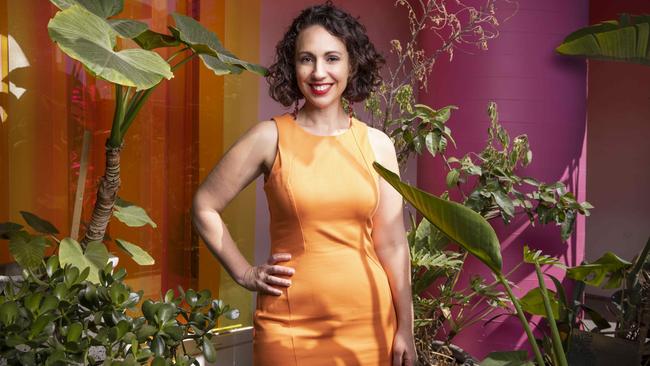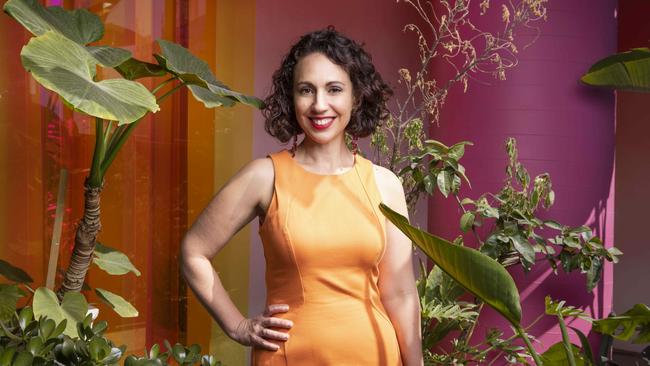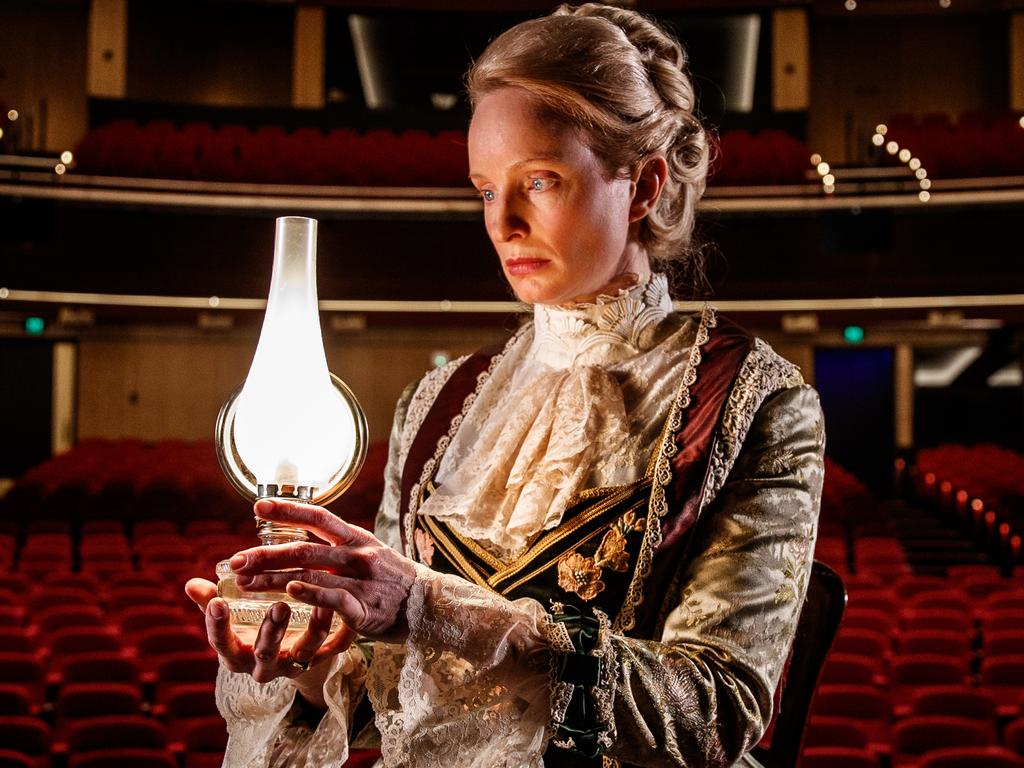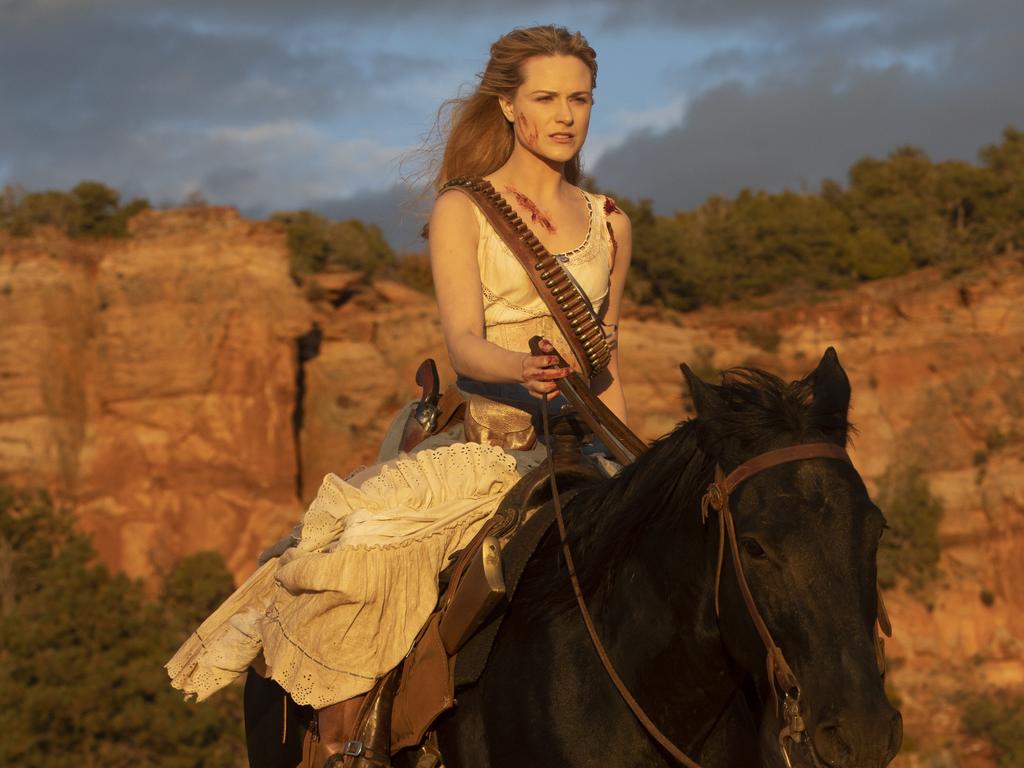Brisbane Festival takes culture to the people during a pandemic
Even phone sex has hustled its way into the unusual Brisbane Festival program, which is going ahead despite the pandemic.

When, in March, the arts world didn’t know whether to pivot left or right, or simply crumple in a heap, Louise Bezzina did something different. She steadied her nerves, took a deep breath, and made a leap into the unknown.
Bezzina was planning her first program as director of the Brisbane Festival and many of the pieces already were in place. At the South Bank Piazza, a vibrant festival hub called Utopia, aglow with pink lights. The stage premiere of Trent Dalton’s megaseller Boy Swallows Universe. Awesome local companies Circa and Dead Puppet Society unveiling new works at the QPAC arts centre. A South American circus troupe, making its Australian debut.
The pandemic changed everything. Theatre doors slammed shut across the country. The spectre of cancelled shows stalked the cultural calendar. Artists everywhere saw their dreams and livelihoods disappear in a moment.
The Brisbane Festival wasn’t happening until September – but, at the start of the lockdown, who knew what the world would look like then? The festival board, under chair Alison Smith, would have to decide: Festival? No festival? Or do what everyone else was doing, and pivot to an online program?
Bezzina and festival chief executive Charlie Cush went back to the drawing board. They met with Queensland Arts Minister Leeanne Enoch – no stranger to festivals, she is the sister of Sydney Festival artistic director Wesley Enoch – and with officials from the Chief Health Officer. They came up with a program that would allow people to gather in a responsible, COVID-safe way. It would be proudly local, a celebration of Queensland artists, rather than risk bringing creative teams across state and national borders. And it had to be scaleable, so events could be dialled up or down, depending on ever-changing health restrictions.
Not negotiable, in Bezzina’s book, was turning the festival into a digital shadow of its former self. It was going to be a live event.
“I get adaptation, I get that we all need to be innovative,” Bezzina says of the mass migration to live streaming that has been happening elsewhere in the arts. “But for me as artistic director of a multi-artform festival, there is nothing like seeing a live performance – that’s the power and the magic. And at a time of such crisis and need, that feels even more important to keep alive.”
A clue to the revised program is on the cover of the festival brochure. It shows a suburban backyard at night and a Hills Hoist bedecked with pink fairy lights. The lights were meant to be installed at the Utopia festival hub at South Bank, where crowds of people otherwise could be expected to gather on Brisbane’s mild spring evenings. Now, the dressed-up clothesline signals a reversal in the usual direction of festival traffic. Instead of bringing people into the city centre, the festival will be going to them.
This is the genius of Bezzina’s COVID-responsive festival. Her series of events called Street Serenades promises to deliver a mini-concert to each of Brisbane’s 190 localities. Residents were invited to nominate their street or cul-de-sac for an impromptu performance, and festival producers went on citywide excursions looking for suitable parklands and other gathering places. Different suburbs will be treated to performances from the likes of Busby Marou, members of the Queensland Symphony Orchestra, beatbox star Tom Thum, and the Australian Voices chorus.
The serenading will reach into even the industrial suburbs, Bezzina says, where performances will be given at people’s workplaces. (The City of Brisbane, Bezzina was reminded, is the largest local government area in Australia.) But in line with health restrictions, the festival has to be careful not to encourage a series of flash mobs and inadvertently ignite COVID hot spots around the city. Messages about these pop-up performances necessarily will be targeted and discreet. “Closer to the time, we’ll let the communities know that we’re coming,” Bezzina says. “But it has to be in a very localised, no-mass-gathering way. That’s the challenge – it’s a kind of anti-marketing campaign.”
Other aspects of the Brisbane Festival have been revised and rethought for the age of social distancing.
While the crowd-pleasing Riverfire pyrotechnics have been cancelled this year, a vast, outdoor light display called Sunsuper Night Sky, devised by techno whiz Robin Fox, can be enjoyed from almost any vantage point around the CBD. Crowds can be avoided. Another installation by Dutch artist Florentijn Hofman will see oversize Gouldian finches perched around the city in a display called Messengers of Brisbane.
QPAC was to have hosted several festival events that could not be included this year. The only production there will be the Brisbane premiere of Circa’s new show Leviathan, with seating in the Playhouse arrayed in COVID-safe fashion. Other attractions in the performing arts program will be at smaller venues – including the Brisbane Powerhouse and the soon-to-open Metro Arts centre in West End – and in sit-down concerts at music room The Tivoli, where Megan Washington and Katie Noonan will be presenting new shows.
Even phone sex has hustled its way into this unusual festival program. Local company The Good Room has commissioned three writers to pen erotic stories that will be read to people via their mobile phones. In these socially distant nights, it’s almost as intimate as you can get.
It certainly is a festival with a difference. But those who know Bezzina will not be surprised that she has been able to come out with a 23-day event when other arts organisations are still under the doona. Her bright and engaging manner is very hard to resist, and she has put every bit of her energy into making a festival program worthy of the name.
The daughter of a Maltese father and a mother who grew up on a sugarcane plantation, Bezzina has been thinking about festivals and cultural placemaking since she was 22 and running her first event, the Mackay Festival.
“Mum will say, when I left home at 17 to move to Brisbane, that I said I would never, ever come back to Mackay,” Bezzina recalls. “But I did. I decided to go home and run this festival. I was completely out of my depth, running an 11-day festival – I had to fundraise, I had to program, I had to do everything.”
There’s no obvious career path for a festival director – other heads of capital-city festivals tend to be creative artists, artistic directors or administrators – but Bezzina set herself on that course.

In Mackay she staged opera in the canefields, commissioned artists from the Pacific Islander community and started a concert series at the botanic gardens that is still running. It’s also where she met her future husband, John Gass, with whom she has two children. She moved back to Brisbane to work at the Queensland Music Festival, led at the time by Lyndon Terracini, now artistic director of Opera Australia.
Terracini became a valued mentor, and she followed him to the Brisbane Festival when he became festival director. “My role at the Brisbane Festival then was working on new commissions, and a lot of work in the community across the city,” she says.
For a time she worked at the Judith Wright Centre of Contemporary Arts in Brisbane’s Fortitude Valley, the only programming job she’s had inside a venue, not a festival setting. In 2011 Bezzina and Gass moved to the Gold Coast and Bezzina found her next opportunity, running a new festival timed to coincide with the Quiksilver Pro surfing competition.
In her eight years there, she turned the Bleach festival into a substantial cultural program, built on the Gold Coast’s outdoorsy lifestyle, local creative talent and spectacular coastline.
There were concerts and even opera on the beach, a durational performance piece, set on a sandbar, about rising tides, and a staged concert work, The Spirit of Churaki, about the Goodjingburra man who was a pioneer surf lifesaver in the early 1900s.
In many ways, Bleach was the perfect finishing school for Bezzina and a major capital-city festival was the obvious next step.
Of course, when she was named director-designate of the Brisbane Festival late in 2018, no one could have foreseen the pandemic that would throw a wet blanket on almost all of the live performing arts. But Bezzina has met the disappointment of cherished projects cancelled or postponed with ingenuity and resolve.
Her debut festival in the big city was always going to be “Boldly Brisbane”, she says, but the pandemic prompted her to double down and capitalise on local talent and local experiences for local audiences. In part, she wanted to honour a commitment she made to herself to work with Brisbane artists, particularly during the pandemic when opportunities are scarce. But she also wanted to engage broadly with the Brisbane community, understanding that every individual the festival connects with is a potential stakeholder in the city’s creative future.
A feature of her program is the kind of site-specific work that she made a speciality at the Gold Coast: outdoor installations, pop-up performances and neighbourhood activities.
One of the successful commissions for her final Bleach program last year was Throttle, a live-action horror movie staged in a Gold Coast paddock where the audience sat in their own cars, as they would at a drive-in. It turned out to be the perfect COVID-safe production for this year’s Brisbane Festival, and Bezzina has parked the show at the Brisbane Showgrounds. Ticket sales have been brisk.
Brisbane Festival chair Alison Smith says Bezzina is a creative dynamo who has been tireless in finding a way to mount an arts festival in ever-changing conditions.
“In our heart of hearts, we always wanted the festival to go ahead – it was a matter of how do you do it?” Smith says. “Online was very much down the list in terms of our preference. We really wanted to find a way that could bring some positive celebration to the community.”
Bezzina says she understood, early on, that she would need to muster all of her creativity and determination if there was to be a festival in Brisbane next month when arts events in other states continue to be postponed or pushed into the nevernever.
“It’s completely uncharted territory,” she says. “A big part is trusting your instincts, trusting your gut, having a vision. It was very clear to me, when the world was changing, that I had to respond quickly at those critical moments.”
Thousands of Brisbane residents, coming out or staying close to home for this year’s festival, will be grateful she did.
The Brisbane Festival, September 4-26.



To join the conversation, please log in. Don't have an account? Register
Join the conversation, you are commenting as Logout